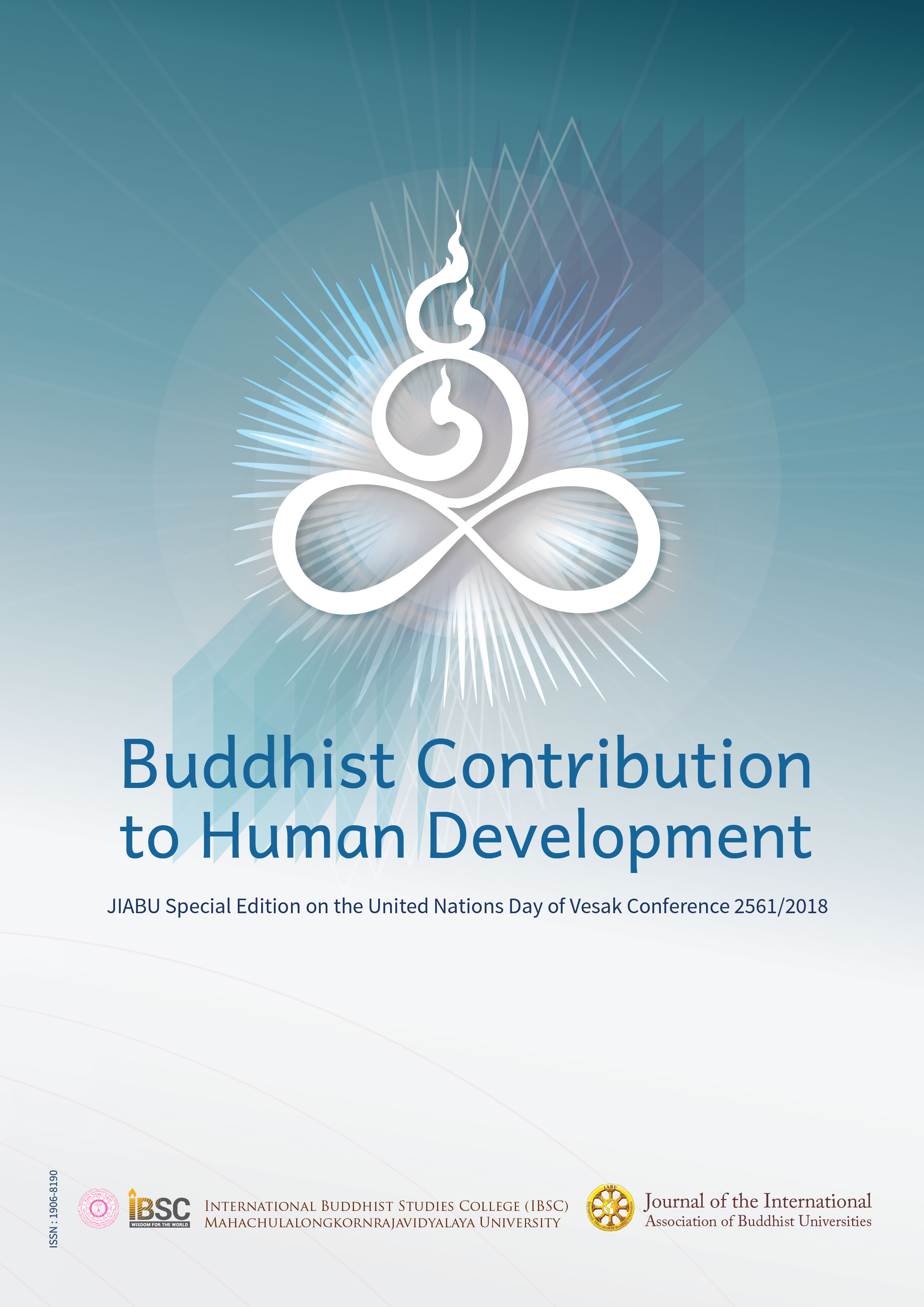A Metta-Buddhist Integrated Method for Conflict Management in The Modern Societies
Main Article Content
Abstract
This qualitative research has three main objectives are: 1) to study the current
conditions of confl ict in the Modern Society, 2) to study the Metta Methods for confl ict
management based on Buddhism, 3) to propose a Metta Buddhist integrated Method for
Conflict management in the Modern Society.
The study which described the first objective is based on the concept of Metta
conditions of conflict in Modern Society also in some of the other terms in Theravāda Suttas
of the Pāli Canon’s, Sutta-Nipāta and Khuddaka-patha and practices of loving-kindness
meditation as Brahma-Vihāra, Metta Karunā, Muditā and Uppekkhā. In this universe there can
be mentioned a Metta more than other necessities it the most powerful and can absent any
battles and conflicts in this modern society. The second objective, to study the Metta-Methods
for confl ict management based on Buddhism “Non-violence”, “ahimsa” and “mother’s love”
in Theravāda Buddhism. Including Mahāyāna Suttas, surroundedly the concept of Metta, it
is the ultimate enlightenment and the fi nal goal of Metta Meditation practice in Buddhism
here means Theravāda and Mahayana Buddhism. The third objective, to propose a Metta
Buddhist integrated Method for conflict management in Modern society.
The essentially Buddhism of both Theravāda and Mahāyāna is definitely practicing
to achieve a pure state of mind, to live with Metta Method so all defilements of human beings happening conflict in a modern society absent, suffering ceases and also including
Metta methods of Buddhism. The researcher proposes this integrated method for conflict
management in the Modern Society in the present reality according to Buddhism.
Article Details
Views and opinions expressed in the articles published by The Journal of the International Association of Buddhist Universities (JIABU), are of responsibility by such authors but not the editors and do not necessarily reflect those of the editors.
References
Anuruddha, Ācariya. A Comprehensive Manual of Abhidhamma: The Abhidhammattha
Sangaha. Venerable Mahāthera Nārada (tr.). Bhikkhu Bodhi, Allan R. Bomhard
(eds.). Charleston: Charleston Buddhist Fellowship, 2007.
Buddharakkhita, Ācariya, Metta: The Philosophy and Practice of Universal Love. Kandy:
BPS, 1989; BPSA, 2011.
Buswell, Robert E. Jr. (ed.). Encyclopedia of Buddhism. Vol. One A-L. New York: Macmillan
Reference USA, 2004.
Chalmers, Robert (ed.). The Majjhima-Nikāya. Vol. III. London: PTS, 1977.
Cowell and Nells (tr.). Jataka stories. Vol. I-VI. London: PTS, 1982.
Davids, T.W. Rhys and Carpenter, J. Estlin (eds.). Surnangale-Vilasint, Dīghanikāya
Commentary. London: PTS, 1886.
Dhammananda, K. Sri. The Dhammapada. Malaysia: Abhiwurdhi Wardhana Society Buddhist
Vihara, Kuala Lumpur, 1988.
Feer, M. Leon (ed.). Saṃyutta-Nikāya. Part II Nidāna-Vagga. Oxford: PTS, 1989.
Goonesekere, L. R. Buddhist Commentarial Literature. Kandy: Buddhist Publication Society,
2008.
Hare, E.M. (tr.). The Book of the Gradual Sayings (Anguttara-Nikāya). Vol. IV (The Books
of the Sevens, Eights and Nines. London: PTS, 1978.
Hinuber (ed.). Dhammapada. Oxford: PTS, 1994.
Horner, I.B. (tr.). Milindas Questions. Vol. II.2 2 Vols. Set. London: Luzac & Company
Ltd., 1969.
Journal of Buddhist Ethics – Francis. H.T. The Jataka, or Stories of the Buddha’s Former
Births. Vol. 5 London: PTS, 1993.
Journal of Buddhist Ethics – Wijayaratana, M. Buddhist Monastic Life. Cambridge University
Press, 1990.
Leon, Feer M. (ed.). Samyutta- Nikāya. Vol. I-IV. Oxford: PTS, 1975, 1990, 1991, 1995.
Mahachulalongkornrajavidyalaya University. Abhidhammapiṭaka: Puggala-Paññatti, (Thai
version). Vol. 36. Bangkok: Mahachulalongkorn rajavidyalaya University, 2539.
Morris, Richard (ed.). Puggala-Paññatti. London: Messrs. Luzac & Company Ltd., 1972.
Namgyel, Mattis. The Power of an Open Question: The Buddha’s Path to Freedom. Boston:
Shambhala, 2010.
Russell Webb, (ed.). An Analysis of the Pāli Canon. Kendy: Buddhist Publication Society,
1975.
Smith, Helmer (ed.). Khuddaka-pātha with Commentary (paramatthajotika I). Oxford:
PTS, 1977.
Steinthal, Paul (ed.). Udāna. London: PTS, 1982.
Walleser M. (ed.). Manorathapūranī (Commentary on Anguttara-Nikāya) Vol. I, II. Oxford:
PTS, 1993, 1968.
https://www.accesstainsight.org/tipitaka/nk/ud/ud.1.10.than.html.
https://ibsc.mcu.ac.th/en/wp_content/uploads/2015/09/Radiant_Mind.pdf
https://en.wikipedia.org/wiki/Buddha_nature#Buddha-nature


